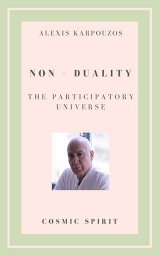NON-DUALITY - ALEXIS KARPOUZOS
The spiritual experience of oneness conduces to the same insight as reasoning through science. Both convey the insight of fundamental interconnection between ourselves, other people, other forms of life, the biosphere and, ultimately, the universe. Science and spirituality, far from being mutually exclusive and conflicting elements, are complementary partners in the search for the path that can enable humanity to recover its oneness with the world. Science demonstrates the urgent and objective need for it; and spirituality testifies to its inherent value and supreme desirability. The Progress to new physics - quantum mechanics, relativity, the universe of the microparticles, theories for complex and non-linear dynamic systems, invisible worlds, chaos leads to order, give a different dimension to the way of thinking of individuals, scientists, and philosophers. The basic elements of the Eastern world view are also those of the world view emerging from modern physics. The Eastern thought
- Year:
- 2015
- 687 Views
We need a sense of the unity of life and of humans for the sake of human welfare and for the survival of the planet. We need a sense of unity with the cosmos so that we can connect with Reality. But we also need a sense of individuality, for the sake of our own dignity and independence and of the loving care for others. We need it to appreciate each natural form, each animal and plant, each human person in their uniqueness. We must preserve the sense of unity and the sense of diversity and multiplicity. We must recognize that the One and the Many are the same thing viewed from different angles. The One is the Many. The One is manifested only in and through the Many. It has no separate existence apart from the Many. Equally the Many are the One. Even during their temporary separation, they are always part of the One, and always united with the One. Every one of us is always part of the One, and can unite with the One at any time we choose
Translation
Translate and read this book in other languages:
Select another language:
- - Select -
- 简体中文 (Chinese - Simplified)
- 繁體中文 (Chinese - Traditional)
- Español (Spanish)
- Esperanto (Esperanto)
- 日本語 (Japanese)
- Português (Portuguese)
- Deutsch (German)
- العربية (Arabic)
- Français (French)
- Русский (Russian)
- ಕನ್ನಡ (Kannada)
- 한국어 (Korean)
- עברית (Hebrew)
- Gaeilge (Irish)
- Українська (Ukrainian)
- اردو (Urdu)
- Magyar (Hungarian)
- मानक हिन्दी (Hindi)
- Indonesia (Indonesian)
- Italiano (Italian)
- தமிழ் (Tamil)
- Türkçe (Turkish)
- తెలుగు (Telugu)
- ภาษาไทย (Thai)
- Tiếng Việt (Vietnamese)
- Čeština (Czech)
- Polski (Polish)
- Bahasa Indonesia (Indonesian)
- Românește (Romanian)
- Nederlands (Dutch)
- Ελληνικά (Greek)
- Latinum (Latin)
- Svenska (Swedish)
- Dansk (Danish)
- Suomi (Finnish)
- فارسی (Persian)
- ייִדיש (Yiddish)
- հայերեն (Armenian)
- Norsk (Norwegian)
- English (English)
Citation
Use the citation below to add this book to your bibliography:
Style:MLAChicagoAPA
"NON-DUALITY - ALEXIS KARPOUZOS Books." Literature.com. STANDS4 LLC, 2025. Web. 22 Feb. 2025. <https://www.literature.com/book/non-duality_-_alexis_karpouzos_1616>.








Discuss this NON-DUALITY - ALEXIS KARPOUZOS book with the community:
Report Comment
We're doing our best to make sure our content is useful, accurate and safe.
If by any chance you spot an inappropriate comment while navigating through our website please use this form to let us know, and we'll take care of it shortly.
Attachment
You need to be logged in to favorite.
Log In